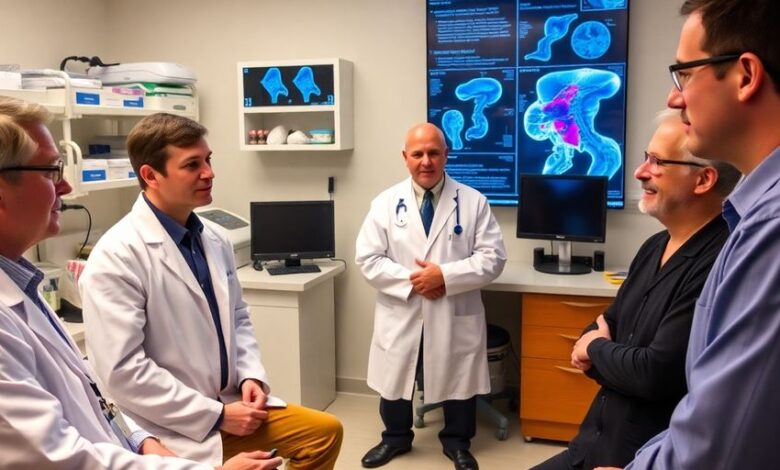Role of Immunotherapy in Mesothelioma

Historical Context of Immunotherapy
Immunotherapy has been a fascinating area of study for oncologists for many years. The concept of harnessing the body’s own immune system to fight cancer has been around for a while, but it wasn’t until recently that it really started to show promise.
In the past decade, the success of immune checkpoint inhibitors (ICIs) has changed the landscape for many types of cancer, putting immunotherapy on the map as a viable treatment option. These ICIs work by lifting the natural brakes on the immune system, allowing it to attack cancer cells more effectively.
This breakthrough has opened the door to a new era in cancer treatment, although it’s just the beginning of what immunotherapy might achieve. For mesothelioma, a rare and aggressive cancer, the journey of immunotherapy is only starting, but its potential is vast.
Current Applications in Mesothelioma
Currently, the use of immunotherapy in treating mesothelioma is still in its early stages. The disease, notorious for its resistance to traditional treatments, presents a unique challenge. However, recent advancements have shown that immunotherapy can be a game-changer.
Clinical trials are actively exploring different approaches, including the use of ICIs. These trials aim to improve survival rates and quality of life for patients. Despite the hurdles, the integration of immunotherapy into mesothelioma treatment plans is gradually gaining traction. The focus is on identifying the most effective strategies and understanding how these therapies can be tailored to individual patient needs.
Future Prospects and Challenges
Looking forward, the future of immunotherapy in mesothelioma treatment is promising yet challenging. There is significant potential for developing more complex therapies that could revolutionize how mesothelioma is treated. However, the road ahead is not without obstacles.
Researchers are working to better understand the molecular mechanisms of mesothelioma and to identify specific targets that can be exploited by immunotherapy. The heterogeneity of the disease adds another layer of complexity, requiring well-designed clinical trials to optimize treatment approaches.
As these trials continue, the hope is that immunotherapy will not only extend lives but also improve the quality of life for mesothelioma patients. Mesothelioma clinical trials are crucial in this endeavor, offering patients access to cutting-edge treatments and the possibility of improved outcomes.
Key Molecular Targets in Mesothelioma Immunotherapy
Mesothelin as a Therapeutic Target
Mesothelin is a protein often found in high amounts on mesothelioma cells but not so much on normal cells. This makes it a prime candidate for targeted therapies. Scientists are interested in using mesothelin as a way to direct treatments straight to the cancer cells, sparing healthy ones. It’s not entirely clear what mesothelin does, but its presence on mesothelioma cells suggests it might help these cells stick together and survive. Treatments like anetumab ravtansine are being tested to attack these mesothelin-covered cells, and early results show promise.
Role of PD-1 and PD-L1 Inhibitors
PD-1 and PD-L1 are proteins that usually help keep the immune system from attacking normal cells. However, cancer cells can hijack this system to avoid being attacked. Inhibitors that block PD-1 and PD-L1 can remove this “shield,” allowing the immune system to target the cancer. Drugs like nivolumab and ipilimumab, which are already approved for pleural mesothelioma, work by blocking these proteins. Durvalumab, another PD-L1 inhibitor, is also being tested in combination with chemotherapy, showing some hopeful outcomes.
Emerging Molecular Targets
Beyond mesothelin and PD-1/PD-L1, researchers are exploring other potential targets. One area of interest is the combination of PD-1 inhibitors with other therapies. For example, combining these inhibitors with treatments targeting other proteins like mesothelin or using therapies like CAR T-cell therapy might improve results. Ongoing trials are looking at these combinations to see if they can provide better outcomes for patients with mesothelioma. As research progresses, the hope is to find more ways to effectively target the disease, offering new options for those affected by this challenging cancer.
Designing Effective Clinical Trials for Mesothelioma Treatment
Challenges in Trial Design
Designing clinical trials for mesothelioma treatment is no small feat. Mesothelioma, a rare and aggressive cancer, presents unique challenges that make trial design particularly complex. The disease’s rarity means that finding enough participants for statistically significant results can be difficult. Moreover, the heterogeneity of mesothelioma, with its varying subtypes and stages, requires trials to be carefully structured to account for these differences. Researchers must also navigate the ethical considerations of testing new treatments on patients who may have few other options. Balancing the need for rigorous scientific methodology with the urgency of providing potential new therapies is a constant challenge.
Importance of Patient Selection
Selecting the right patients for clinical trials is crucial for their success. In mesothelioma studies, patient selection is particularly important due to the disease’s variability. Factors such as the patient’s overall health, previous treatments, and specific mesothelioma subtype can all influence how they respond to new therapies. By carefully choosing participants, researchers can ensure that the trial results are relevant and applicable to the broader patient population. This careful selection process also helps to identify which patients are most likely to benefit from the new treatment, potentially enhancing their quality of life and leading to more personalized treatment approaches.
Innovative Trial Methodologies
In recent years, there has been a push towards more innovative trial methodologies in mesothelioma research. Traditional randomized controlled trials, while valuable, are not always feasible for rare diseases like mesothelioma. Adaptive trial designs, which allow for modifications based on interim results, offer a flexible alternative that can speed up the development of new treatments. Basket trials, which test the effectiveness of a single drug on multiple cancer types sharing a common mutation, are another innovative approach being explored. These methodologies not only help overcome the challenges of limited patient numbers but also enable faster identification of promising therapies, ultimately accelerating the path from research to clinical application.
Immune Checkpoint Inhibitors: A New Hope for Mesothelioma
Mechanism of Action
Immune checkpoint inhibitors (ICIs) have become a promising approach in treating various cancers, including mesothelioma. These inhibitors work by blocking proteins that prevent the immune system from attacking cancer cells. Normally, proteins like PD-1 and PD-L1 act as brakes on the immune system, ensuring it doesn’t attack healthy cells. However, cancer cells can exploit these checkpoints to avoid being targeted by the immune system. By inhibiting these checkpoints, ICIs essentially release these brakes, allowing the immune system to recognize and destroy cancer cells more effectively. This mechanism has shown potential in turning the tide against mesothelioma, offering a new avenue for treatment where traditional therapies have often fallen short.
Clinical Trial Outcomes
Clinical trials investigating ICIs for mesothelioma have yielded promising results. Studies such as the Checkmate 743 trial have demonstrated that combining nivolumab with ipilimumab can be more effective than standard chemotherapy. These trials have shown improved survival rates and a better quality of life for patients. However, it’s important to note that not all patients respond to ICIs, highlighting the need for further research to understand the factors influencing treatment success. Despite these challenges, the positive outcomes observed in many trials underscore the potential of ICIs to change the landscape of mesothelioma treatment.
Combination Therapies
Combining ICIs with other therapies is an area of active research, aiming to enhance their effectiveness. By pairing ICIs with chemotherapy or radiation, researchers hope to create a more comprehensive attack on mesothelioma. For instance, combining ICIs with chemotherapy might help in reducing tumor size, making the cancer more susceptible to immune attack. Similarly, radiation can sometimes increase the effectiveness of ICIs by causing cancer cells to release antigens that the immune system can target. These combination strategies are still under investigation, but they hold the promise of improving outcomes for patients with mesothelioma. As research progresses, these combined approaches could become a cornerstone in the treatment of this challenging disease.
In summary, immune checkpoint inhibitors represent a beacon of hope in the fight against mesothelioma, offering new strategies to combat this aggressive cancer. As studies continue to refine these treatments, the future looks increasingly hopeful for patients and their families.
The Impact of Tumor Microenvironment on Immunotherapy
Understanding Tumor-Immune Interactions
The tumor microenvironment plays a crucial role in shaping how cancer and the immune system interact. In mesothelioma, this environment is often hostile to immune cells, creating barriers that prevent effective immune responses. The tumor’s ability to suppress immune activity is a significant challenge for immunotherapy treatments. Tumors can recruit immune-suppressive cells and release factors that inhibit immune cell function, making it difficult for the body to mount an effective attack against cancer.
Strategies to Modify the Microenvironment
To improve the effectiveness of immunotherapy in mesothelioma, researchers are exploring ways to alter the tumor microenvironment. One approach is to use drugs that target specific pathways involved in immune suppression. By blocking these pathways, it may be possible to enhance the immune system’s ability to recognize and destroy cancer cells. Another strategy involves using treatments that can change the composition of the tumor microenvironment, making it more conducive to immune cell infiltration and activity.
Clinical Implications
Understanding and modifying the tumor microenvironment has significant implications for the clinical application of immunotherapy in mesothelioma. By overcoming the barriers posed by the tumor microenvironment, it may be possible to increase the efficacy of existing immunotherapies and develop new treatments. This could lead to better outcomes for patients with mesothelioma, offering hope for improved survival rates and quality of life. However, achieving these goals requires ongoing research and clinical trials to identify the most effective strategies for modifying the tumor microenvironment.
Oncolytic Virus Therapy in Mesothelioma
Mechanism and Efficacy
Oncolytic virus therapy is a fascinating area of research in cancer treatment, and it’s gaining traction in mesothelioma. The idea here is simple yet brilliant: use viruses to selectively infect and destroy cancer cells. These viruses are engineered to target tumor cells specifically, leaving healthy cells alone. Once inside, they replicate, causing the cancer cell to burst and die. This not only kills the tumor cells but also exposes them to the immune system, potentially triggering a broader immune response.
In mesothelioma, the location of tumors in the pleura makes them accessible for direct injection of these viruses. This method has shown promise in preclinical studies, where various viruses, like herpes and measles, have been used. For instance, a modified herpes virus demonstrated effectiveness in early trials, where it was injected directly into the pleural cavity of patients. Although these trials are still in their infancy, the results are encouraging, showing stabilization in some patients without severe side effects.
Current Clinical Trials
Clinical trials are the backbone of advancing any new treatment, and oncolytic virus therapy is no exception. Currently, there are several ongoing trials focusing on mesothelioma. These trials are exploring different virus strains and combinations with other treatments. For example, some studies are looking at combining oncolytic viruses with immunotherapy drugs to enhance the immune response against tumors.
One of the challenges in these trials is ensuring the safety and selectivity of the virus. Researchers are working on engineering viruses that are not only effective but also safe for patients. So far, results have been promising, with some trials showing improved survival rates and manageable side effects. As these trials progress, they hold the potential to offer new hope for mesothelioma patients who have limited treatment options.
Future Directions
The future of oncolytic virus therapy in mesothelioma looks promising but is filled with challenges. Researchers are optimistic about the potential of these therapies to change the landscape of cancer treatment. One area of focus is the development of combination therapies. By pairing oncolytic viruses with other treatments, like chemotherapy or radiation, the hope is to enhance their effectiveness and provide a more comprehensive attack on the cancer.
Another exciting direction is the personalization of oncolytic virus therapy. By tailoring the treatment to the individual patient’s tumor characteristics, doctors could potentially increase the therapy’s success rate. As research continues, the goal is to refine these therapies to make them safer and more effective, offering a new lifeline for patients battling mesothelioma.
For those interested in exploring treatment options, Moffitt Cancer Center offers extensive resources, including participation in clinical trials, for mesothelioma patients.
Adoptive Cell Therapy: CAR-T and Beyond
CAR-T Cell Therapy in Mesothelioma
CAR-T cell therapy is a cutting-edge approach in the treatment of mesothelioma and other cancers. By engineering T cells to recognize and attack tumor cells, this therapy offers a new avenue for patients who have exhausted traditional treatment options. In recent trials, CAR-T cells have been specifically designed to target mesothelin, a protein commonly found on mesothelioma tumors. This innovative immunotherapy has shown promise, with clinical trials indicating its potential to improve patient outcomes.
Challenges and Innovations
While CAR-T therapy represents a significant advancement, it is not without challenges. One major hurdle is the potential for immune-related toxicities, which researchers are working to mitigate by engineering CAR-T cells to limit these effects. Additionally, the persistence of CAR-T cells in the body is crucial for sustained efficacy, and ongoing studies are exploring ways to enhance this persistence. Innovations in this field are continuously emerging, aiming to improve the safety and effectiveness of CAR-T therapies.
Future Prospects
The future of adoptive cell therapy extends beyond CAR-T cells. New strategies, such as TRuC-T therapy, are being developed to further enhance the body’s immune response against cancer. These therapies aim to overcome the limitations of current treatments and offer hope for better outcomes. As research progresses, the integration of adoptive cell therapies with other treatment modalities, such as immune checkpoint inhibitors, is expected to play a pivotal role in advancing mesothelioma treatment.
The Role of Biomarkers in Mesothelioma Clinical Trials
Identifying Predictive Biomarkers
In the world of mesothelioma treatment, biomarkers are becoming a key player. They help doctors figure out which patients might respond well to certain treatments. This is super important because mesothelioma is a tough cancer to treat, and not every therapy works for every patient. Researchers are constantly on the hunt for these biomarkers, trying to pinpoint those that can predict how a patient will react to a treatment before it even starts. This way, doctors can tailor therapies to fit each patient better, potentially improving outcomes and sparing patients from unnecessary side effects.
Biomarker-Driven Trial Design
Designing clinical trials around biomarkers is like having a roadmap for treatment. Instead of a one-size-fits-all approach, these trials focus on patients who have specific biomarkers, which might indicate their likelihood of benefiting from a treatment. This targeted approach helps in getting clearer results about a drug’s effectiveness. It’s like knowing the exact ingredients needed for a recipe to work perfectly. By focusing on the right group of patients, these trials can provide more reliable data, which is crucial for developing new treatments for mesothelioma.
Challenges in Biomarker Validation
Even though biomarkers hold a lot of promise, validating them is no walk in the park. It’s a complex process that involves rigorous testing to ensure that a biomarker is truly predictive of treatment outcomes. One of the major hurdles is the variability in how different patients’ bodies might respond. This means what works as a biomarker for one person might not work for another. Researchers need to conduct extensive studies to verify these biomarkers, making sure they are accurate and reliable. Despite the challenges, the pursuit of validated biomarkers continues, as they are essential for advancing personalized treatment strategies in mesothelioma.
In the end, the role of biomarkers in evaluating the effectiveness of treatments for malignant mesothelioma can’t be overstated. They are not just guiding treatment decisions but are also crucial in the design of clinical trials that aim to improve the lives of patients battling this aggressive cancer.
Combining Immunotherapy with Traditional Treatments
Combining immunotherapy with traditional treatments like chemotherapy, radiation, and surgery is shaping up to be a promising strategy for mesothelioma. This approach aims to harness the strengths of each method to enhance overall treatment effectiveness.
Chemotherapy and Immunotherapy Synergy
Chemotherapy has long been a cornerstone in cancer treatment, but its effectiveness in mesothelioma has limitations. By integrating immunotherapy, there’s potential to boost the immune system’s ability to target and destroy cancer cells. Recent studies are exploring whether combining chemotherapy with immune checkpoint inhibitors can enhance the body’s immune response. This combination might also help reduce tumor resistance, a common challenge in chemotherapy.
Radiation and Immune Modulation
Radiation therapy, known for its precision, can sometimes trigger an immune response by causing cancer cells to release signals that attract immune cells. When paired with immunotherapy, this effect might be amplified, leading to better outcomes. Researchers are investigating if radiation can “prime” tumors, making them more susceptible to immune attacks. This synergy could potentially improve the effectiveness of both treatments.
Surgical Interventions and Immunotherapy
Surgery remains a key option for mesothelioma patients, especially when the disease is caught early. However, surgery alone often can’t eliminate all cancer cells. Immunotherapy might fill this gap by targeting residual cancer cells post-surgery. Trials are underway to see if administering immunotherapy before or after surgery can improve survival rates. This combination approach could also minimize the risk of recurrence, offering new hope for patients.
In conclusion, the integration of immunotherapy with traditional treatments is an exciting frontier in mesothelioma care. As clinical trials continue to explore these combinations, there’s hope for more effective and comprehensive treatment strategies. Patients can explore clinical trials for mesothelioma to find opportunities that might be suitable for their specific condition.
Regulatory and Ethical Considerations in Mesothelioma Trials
When it comes to clinical trials for mesothelioma, regulatory and ethical considerations are paramount. These trials are crucial for advancing treatment options, but they must be conducted with strict oversight to ensure patient safety and ethical integrity.
Ensuring Patient Safety
Patient safety is the cornerstone of any clinical trial. In mesothelioma trials, this means rigorous monitoring and adherence to protocols designed to protect participants. Researchers must ensure that all interventions are tested for safety in preclinical studies before being administered to patients. Moreover, continuous monitoring throughout the trial helps in identifying any adverse effects early, allowing for prompt intervention.
Ethical Trial Design
Designing ethical trials involves more than just following guidelines. It requires a commitment to transparency and fairness. Trials must be structured to provide the maximum benefit to participants while minimizing risks. This includes obtaining informed consent, where patients are fully aware of the potential risks and benefits of their participation. Additionally, ethical considerations extend to the selection of trial participants, ensuring diversity and inclusivity to make the findings applicable to a broader population.
Regulatory Challenges and Solutions
Navigating the regulatory landscape for mesothelioma trials can be complex. Different countries have varying regulations, which can complicate international collaborations. To address these challenges, researchers often work closely with regulatory bodies to ensure compliance with local and international laws. This collaboration can streamline the approval process and facilitate the sharing of data across borders. Furthermore, incorporating immune checkpoint inhibitors into treatment protocols has shown promise in enhancing the efficacy of mesothelioma therapies, highlighting the need for adaptive regulatory frameworks that can accommodate emerging treatments.
Patient-Centric Approaches in Clinical Trials
Incorporating Patient Feedback
In the evolving landscape of mesothelioma treatment, patient feedback has become increasingly important. Patients bring unique perspectives that can help shape clinical trials to better meet their needs. By actively involving patients in the design and implementation of trials, researchers can gain insights into what truly matters to those affected by the disease. This collaboration can lead to more relevant and effective treatment options, as patients often highlight aspects of their experience that might be overlooked by clinicians.
Improving Quality of Life
Quality of life considerations are paramount in clinical trials for mesothelioma. While extending survival is a key goal, the impact of treatment on a patient’s daily life cannot be ignored. Trials are increasingly focusing on the balance between treatment efficacy and quality of life. This involves assessing not just the physical side effects of therapies but also their emotional and social impacts. By prioritizing quality of life, researchers aim to develop therapies that not only prolong life but also enhance its quality.
Tailoring Treatments to Patient Needs
Personalized medicine is at the forefront of modern mesothelioma cancer treatment, and mesothelioma is no exception. Tailoring treatments to individual patient needs involves understanding the unique genetic and molecular characteristics of each patient’s tumor. This approach allows for more precise and effective therapies, minimizing unnecessary side effects and maximizing potential benefits. By focusing on the individual rather than a one-size-fits-all approach, clinical trials can offer more hope to patients, providing them with treatments that are specifically designed for their unique situation.




